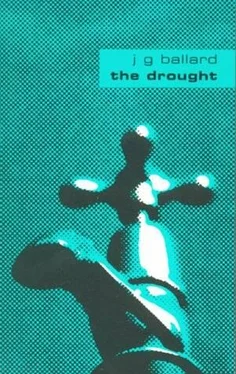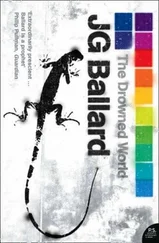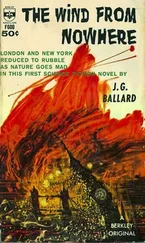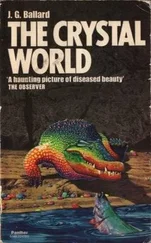Floodlights blazed from a dozen posts along both fences. Crouching down, his white arms motionless in the grass, Ransom waited for them to go out. He looked up as there was a roar from the open interval beyond the fence.
Crossing the dunes and creeks, in full view of the platoon of soldiers on the dunes above the inner fence, were some forty or fifty men. Shouting to each other, they jumped in and out of the shallow creeks, one or two of them stopping to fire at the floodlights. Unscathed, they reached the wire, and everywhere people started to climb to their feet and run forward into the light.
Ransom reached down and took Catherine's arm. "Come on!" he shouted. They scaled the shallow slope up to the fence. A wide section of the wire coil had been removed, and they crawled through, then darted down into a narrow creek. Dozens of other people were moving along with them, some pulling little children, others carrying rifles in their hands.
They were halfway across when a light machine gun began to fire loosely over their heads from an emplacement below the huts, its harsh ripple coming in short bursts of two or three seconds. Partly hidden by the rolling ground, everyone pressed on, climbing through a gap cut in the inner fence. Then, ten yards from Ransom, a man was shot dead and fell backwards into the grass. Another was hit in the leg, and lay shouting on the ground as people ran past him.
Ransom pulled Catherine down into an empty basin. Everywhere men and women were rushing past them in all directions. Several of the floodlights had gone out, and in the flaring darkness he could see men with carbines retreating to the dunes beyond the huts. To their left the open channel of the river ran to the sea, the beach washed like a silver mirror.
The scattered shooting resumed, the soldiers firing over the heads of the hundreds of people moving straight toward the sea. Taking Catherine by the arm, Ransom pulled her toward the opening in the inner fence. Behind them, the bodies lay among the dunes, tumbled awkwardly in the coarse grass.
Following an empty creek, they moved away from the huts. As they crouched down to rest before their final dash to the sea, a man stood up in the brittle grass ten feet above them. With a raised pistol he began to fire across the dunes, shooting straight at the people driven back by the soldiers.
Looking up at him, Ransom recognized the stocky shoulders and pugnacious face.
"Grady!" he called. "Hold off, man!"
As they stumbled from their hiding place, Grady turned and searched the darkness below him. He leveled his pistol at them. He seemed to recognize Ransom, but gestured at him with the weapon.
"Go back!" he shouted hoarsely. "Keep off, we came here first!"
More people appeared, running head down along the dry bed of the creek. Grady stared at them, his little face for a moment like an insane sparrow's. Raising his pistol, he fired blindly at Ransom's shadow. As Catherine crouched down on her knees, Ransom drew the pistol from his belt. Grady darted forward, his eyes searching the darkness among the clumps of grass, his small figure illuminated in the floodlights. Holding the butt of the revolver in both hands, Ransom stood up and shot him through the chest.
He was kneeling over the little man, his own weapon lost somewhere in the creek, when a platoon of soldiers appeared out of the darkness. Lying down, they began to fire over the heads of the people further down the creek.
A bare-headed lieutenant crawled over to Ransom. He glanced down at the body. "One of ours?" he asked breathlessly.
"Grady," Ransom said. The lieutenant jumped to his feet and ordered his men back up the slope toward the huts. The firing had slackened as the main impetus of the advance spent itself, and many people were retreating back to the fences. Others had got through, and were running down to the water between the huts, ignored by the soldiers further along the beach, who let them go by.
The lieutenant pushed Catherine behind the edge of the old sea wall. To Ransom he shouted: "Take his gun and keep firing! Over their heads, but if they come at you bring one of them down!"
The soldiers moved off, and Ransom joined Catherine behind the wall. The sea was only fifty yards away, the waves sluicing across the wet sand. Exhausted by the noise, Catherine leaned limply against the wall.
Two or three figures came racing across the flat channel. Ransom raised his pistol, but they ran straight toward him. Then the last of them appeared, Philip Jordan with the old Negro in his arms. He saw Ransom standing in front of him, the pistol raised in his hand, but ran on, limping on his bare feet.
Ransom threw away the pistol. All along the beach small groups of people were lying in the shallows as the waves splashed across them, watched by the soldiers. Running after the others, Ransom saw Philip Jordan on his knees by the water's edge, lowering the old man to the waves. Ransom felt the water sting his legs, and then fell headlong into the shallows, his suit soaked by the receding waves, retching emptily into the cold, bitter stream.
Under the empty winter sky, the salt-dunes ran on for miles. Seldom varying more than a few feet from trough to crest, they shone damply in the cold air, the pools of brine disturbed by the in-shore wind. Sometimes, in a distant foretaste of the spring to come, their crests would be touched with white streaks as a few crystals evaporated out into the sunlight, but by the early afternoon these began to deliquesce, and the gray flanks of the dunes would run with a pale light.
To the east and west the dunes stretched along the coast to the horizon, occasionally giving way to a small lake of stagnant brine or part of a lost creek cut off from the rest of its channel. To the south, in the direction of the sea, the dunes gradually became more shallow, extending into long saltflats. At high tide they were covered by a few inches of clear water, the narrowing causeways of firmer salt reaching out into the sea.
Nowhere was there a defined margin between the shore and sea, and the endless shallows formed the only dividing zone, land and water both submerged in this gray liquid limbo. At intervals the skeleton of a derelict conveyer emerged from the salt and seemed to point toward the sea, but then, after a few hundred yards, sank from sight again. Gradually the pools of water congregated into larger lakes, small creeks formed into continuous channels, but the water never seemed to move. Even after an hour's walk, knee-deep in the dissolving slush, the sea remained as distant as ever, always present and yet lost beyond the horizon, haunting the cold mists that drifted across the salt-dunes.
To the north, the dunes steadily consolidated themselves, the pools of water between them never more than a few inches deep. Eventually, where they overran the shore, they rose into a series of large white hillocks, like industrial tippings, which partly concealed the coastal hills. The foreshore itself, over the former beaches, was covered by the slopes of dry salt running down to the dunes. The rusty spires of old distillation columns rose into the air, and the roofs of metal huts carried off their foundations floated like half-submerged wrecks. Further out there were the shells of old pumping gear and the conveyers that once carried the waste salt back into the sea.
A few hundred yards from the shore, the hulks of two or three ships were buried to their upper decks in the salt, their gray superstructures reflected in the brine-pools. Small shacks of waste metal sheltered against their sides and beneath the overhangs of the sterns. Outside their lean-to doors, smoke drifted from the chimneys of crude stills.
Beside each of these dwellings, sometimes protected by a palisade of stakes, was a small pond of brine. The banks had been laboriously beaten into a hard margin, but the water seeping everywhere continually dissolved them. Despite the to-and-fro movements of the inhabitants of the salt wastes, no traces of their footsteps marked the surface, blurred within a few minutes by the leaking water.
Читать дальше
Конец ознакомительного отрывка
Купить книгу








